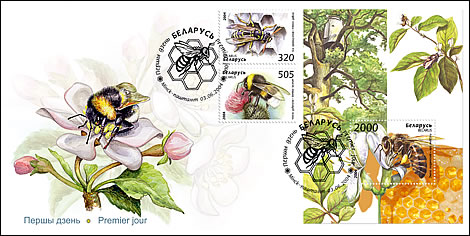For the first time, a research project has investigated how a neonicotinoid pesticide, clothianidin, affects both honeybees and wild bees under field conditions in agricultural landscapes. The study shows that honeybees can cope with exposure to the pesticide, but that it has a strong negative impact on wild bees. The researchers, from Lund University and Swedish University of Agricultural Sciences, in collaboration with the Swedish Board of Agriculture, have investigated how the neonicotinoid clothianidin affects domesticated and wild bees under Swedish field conditions. The research findings have now been published in the scientific journal Nature, and they show that the insecticide has a negative impact on wild bees. This is severe, because wild bees play an important role in pollination of crops. Wild bees are in Sweden bumblebees and solitary bees. “We saw a clear negative impact on growth and reproduction in bumblebee colonies near treated oilseed rape fields”, said Maj Rundlöf from Lund University, the coordinator and principal investigator for the field study.
Source: Press release LUND University, 20 April 2015
Link to article in Nature: http://nature.com/articles/doi:10.1038/nature14420
Link to video material about the study: https://youtu.be/PPI-R43_B3k

- Log in to post comments

Matt Shardlow of Buglife comments
Researchers found that compared with areas without neonicotinoid seed treatments, in the vicinity of crops treated with clothianidin populations of wild bees were slashed in half, solitary bees did not nest at all, and bumblebee nests were half as heavy and produced less than a third as many queens.
http://www.nature.com/nature/journal/vaop/ncurrent/full/nature14420.html
This evidence follows the recent revelation that the UK Government’s own bumblebee study actually revealed correlations between neonicotinoid insecticide contamination and bee health, but despite knowing better the Government misleadingly claimed that their research had found "no relationship between colony growth and neonicotinoid residues" https://www.buglife.org.uk/blog/matt-shardlow-ceo/pesticide-report-was-…
“The pesticide companies have been hiding behind the absence of sufficiently robust field studies to call for inaction in protecting wild pollinators from insecticides. This position is no longer tenable in light of this highly conclusive study.” Said Matt Shardlow, Buglife CEO. “We hope this puts the debate about impacts of neonicotinoids on bees and pollinators to bed, because there are growing concerns about the impacts of these toxins on soil life and in freshwater and nothing has been done to regulate this environmental damage, it is time for the authorities to reassess the wider environmental impacts of neonicotinoids and take further action to restrict their use”.
Buglife hopes that lessons are learnt and quickly applied to pesticide regulation. Current processes are inadequate to secure environmental safety, damaging pesticides are being approved and it then takes years for governments to overcome resistance from the pesticide manufacturers and ban them. Buglife was the first wildlife charity to call for a neonicotinoid ban after a science review in 2009 - https://www.buglife.org.uk/sites/default/files/revised%20neonics%20repo… – concerns raised about the impacts of these toxins on freshwater habitats and earthworms have yet to be addressed.
The study also found that neonicotinoids were poisoning the pollen and nectar of wildflowers near arable fields, and another paper in the same edition of Nature indicates that bees may develop a taste of neonicotinoids. http://www.nature.com/nature/journal/vaop/ncurrent/full/nature14414.html
Matt Shardlow
Chief Executive
Twitter - @MattEAShardlow
01733 201210
079 21 700151
www.buglife.org.uk